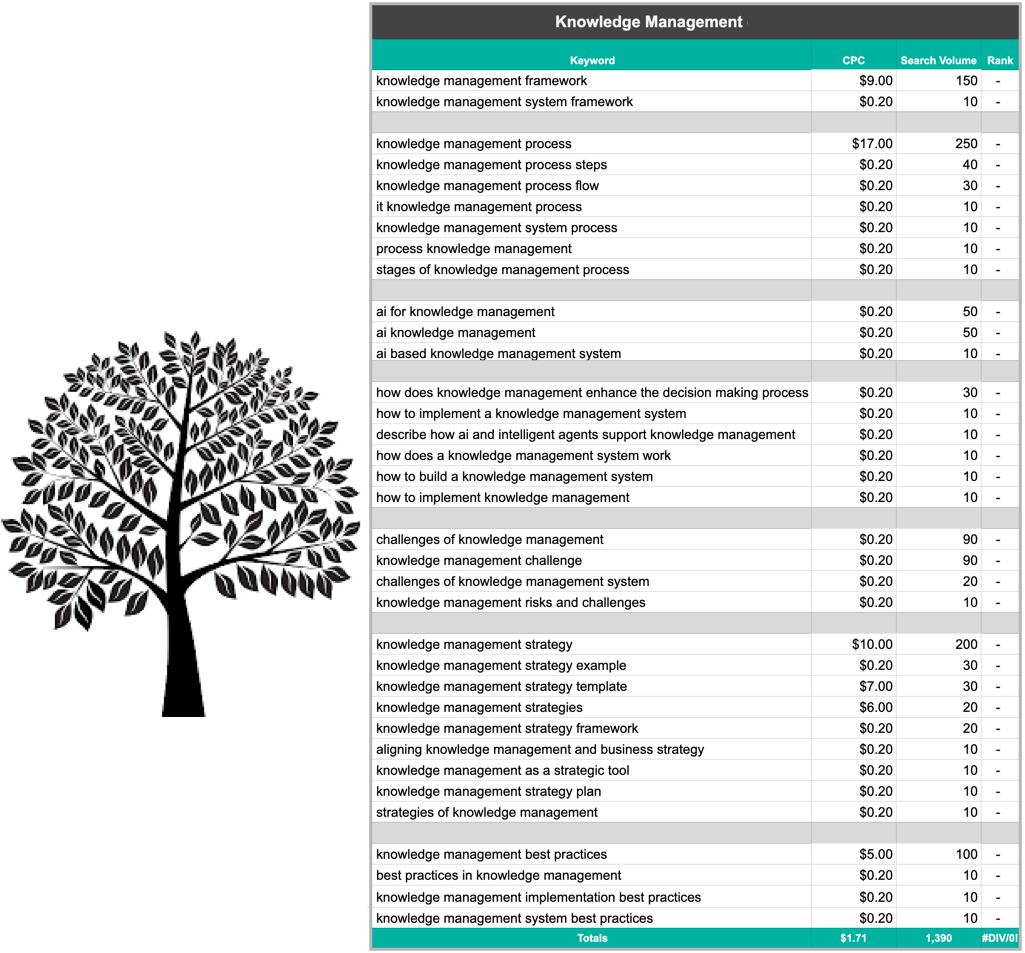Search engines are the greatest knowledge bases ever created. They understand the quality of a content result based on an algorithm. Thousands of top engineers have focused 20 years to bring us here.
Search engines’ job: Deliver a quality result to the user searching for the answer to a question.
This starts with a focus on a single keyword.
Search drives the internet. Intent drives search. As marketers we are trying to connect our content to an audience intent on finding an answer. If they find it, they read our content. If they don’t, it really doesn’t matter.
Quality content drives quality search engine results — this is a simple concept.
Implementing a Real Keyword Strategy is Misunderstood
Good strategy should be met with champagne and flowers.
But this is rarely how founders and CEOs act when presented with a keyword theme strategy. They myopically focus on ranking for the single keyword that keeps them awake at night. Rather than seeing the path to ranking laid at their feet.
“Most people are afraid of suffering. But suffering is a kind of mud to help the lotus flower of happiness grow. There can be no lotus flower without the mud.”
—Thich Nhat Hahn
They want vegetables from the garden, but they don’t want the work of growing them. Or what we call:
How to develop a keyword research process for your business.
It’s frustrating to the founder because they’ve invested in content. They’ve hired SEOs, they’ve paid for to develop a new website. But every time they fire up the all-powerful Google, the keyword they want their business to rank for is on page 3 or 10, or “not found.”
These results are typical. I’ve been working on a document I call a Keyword Theme Strategy for over 10 years. This document is the best way of:
- understanding a business’ keyword ecosystem (their market’s keyword universe)
- tracking their ranking for specific focus keywords.
- understanding where to focus resources to create the right content
The Keyword Theme Strategy is the perfect vehicle to get a CEO or CMO or anyone to understand how SEO works.
When complete, you have a complete scaffolding of the keywords that matter to your market. You know exactly what your market is searching for. And you will understand exactly what you need to do to rank.
Not to mention, you will understand how to write your content. So you can focus on creating the best content in your market. The ultimate expression of lots of single keywords that together, will attract the perfect buyer for your products.
Your site will begin to rank for smaller keywords. Building momentum to rank for the keyword that keeps you awake at night.
Focusing on a single keyword starts with a single query.
A Single Keyword – A Leaf

The leaf of search, this is all you’re trying to win for.
The is a query in your Keyword Theme Strategy. There’s a lot going on, to create content that’s focused on the root reason why a piece of content may not rank.
 We are talking to a searcher with that exact question. Our job is to communicate all the reasons why the content may not rank.
We are talking to a searcher with that exact question. Our job is to communicate all the reasons why the content may not rank.
The Keyword Subgroup – A Branch

We are able to rank for the content we produce the branch there are many keywords associated with a single leaf. These are close matches, The searcher reorganized words inside the query. A keyword is plural. The searcher added or didn’t include a single word.
The trends we find here can be important to the content we produce.
But these keywords are too related to be their own, so they exist on the same branch of content. This will be a group of three to seven keywords all held together by a common thread. Let’s say in this case “knowledge management” is our theme and “process” is the common keyword holding this branch together.
All the keywords in this sub-group will contain “knowledge management” and “process”.

As a subject matter expert your content will address the root causes of why “process” is so important to defining “knowledge management”?
When you understand all the associated keywords surrounding a topic—you write the underlying reasons why “process” is important to the theme.
Then you’ve naturally addressed the specific things your audience needs to know. Your content will rank, and your competition’s content will not. Because you take a holistic approach to SEO and content.
A Keyword Theme – The trunk.

With enough leaves, we can create branches. With enough branches we create the thematic trunk. Every Keyword Theme Strategy has between 6-25 trunks, depending on how deep you want to go.
Into action.
Putting a Keyword Theme together takes hours. Requires lots of revisions and feedback from stakeholders like the CEO. We make 1000s of small choices focused on creating your business’ universe of keywords.

But in the end you have a complete keyword map to hand to your writers. And this map gives you the absolute best chance at winning your SEO universe.
The Keyword Theme Strategy – The Forest

Seeing the forest through the trees.
How I explain the Keyword Theme Strategy to CEO and founders.
When you start creating content, your goal to win a single leaf, a single keyword on your keyword theme.
When you win enough leaves, Google will give you the branch.
When you win several branches Google will give you the trunk. And when you win enough trunks Google will give you the forest.
Win the forest. You win your market. It all starts with focus on a single keyword.
